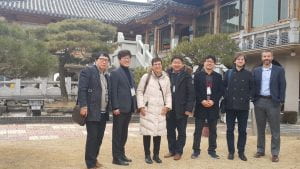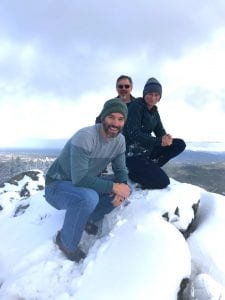This Faculty Spotlight post features Dr. Kris Kyle. We are very excited to welcome him as our newest Linguistics/LTS Faculty. Kris joined our team in Fall 2019.
We are very glad to have you join our faculty! What drew you to the University of Oregon and the Linguistics Department?
Thanks! I am very happy to be here. This department is a great place to be for a number of reasons. First, I was really drawn to the functional perspective to language that is taken by all of the faculty members. My own research into second language acquisition and second language assessment falls firmly within the larger functional paradigm (and specifically within usage-based language learning), so I really feel like I fit in theoretically. Second, I really appreciate the diversity of the research interests that the faculty hold – I get to learn something new almost every Friday at the Gloss colloquium talks! Finally, I really appreciate the collegiality of the faculty, students, and staff in the department. The Linguistics Department most certainly is a warm and happy family!
How will you be involved in the LTS program? What do you look forward to contributing to it?
To start, I will be teaching the Research Methods course (Winter 2020) and the Assessment (Spring 2020) course for the LTS program. I will likely also teach courses related to corpus linguistics and second language acquisition in the future. I look forward to helping students design research projects and/or think critically about the ways in which language proficiency is/has been/can be assessed!
Tell us about your experiences teaching in Korea. How did they lead you to the research questions you are asking now?

A recent trip to give a talk at Korea National University of Education in Cheongjui
I started my language teaching career in South Korea in 2006 (and taught there for almost three years). I had previously earned a BA in English and Spanish, and had taught 8th-grade English for one year at a private secondary school in Arkansas. I started out teaching at an after school test-prep school (hakwon) in Seoul, where I taught TOEFL writing and TOEFL speaking courses, primarily to middle-school age children. After doing that for seven months or so, my wife and I decided to leave Seoul and work for a rural school district (in Danyang-gun, Chungcheongbuk-do). In that position, I traveled to a different school each week and primarily taught middle-school conversation and “American culture”. Whereas my first job was extremely structured (and we were expected NOT to deviate from the prescribed lesson plans), my rural job was extremely unstructured. I had to create a curriculum on my own and generate all materials. It was in this position that I truly learned that I had a lot more to learn! After a year in Danyang, my wife and I were offered positions at Yonsei University (Wonju campus). In this position, I taught courses in conversation and also in TOEIC and TOEFL test prep. I found that I really enjoyed teaching university-aged students, which became a catalyst for future education. After returning from South Korea in 2009, I began graduate school (MA from Colorado State in 2011, PhD from Georgia State in 2016) where I continued to teach English for academic purposes (and writing in particular).
Some of my recent and current research explores the validity of standardized second language assessment tools (and in particular assessments of speaking and writing proficiency). The seeds for this research began early in my career as a test prep instructor, particularly as I grappled with how speaking and writing tasks were evaluated. One thing I am really interested in is the characteristics of what makes one sample second language (L2) writing or speaking “better” or seem more proficient than another. There are of course individualized factors that contribute to this, but there also seem to be a number of linguistic predictors as well (this is what I am really interested in).
What is an example of something you are currently working on that may interest L2 professionals?
I am currently working on a project (funded by ETS) that explores the linguistic demands of attending a US university. In particular, I am focusing on the degree to which the language used in technology-mediated environments (e.g., Canvas) is substantively different from the language used in “traditional” learning environments. The direct purpose of the project is to inform the development of the TOEFL by helping to ensure that the language demands of the assessment tasks are similar to those of a university experience (including interaction in technology-mediated learning environments). This research (and other corpus-based research) also has direct implications for English for academic purposes classrooms because we want to ensure that the text types (i.e., registers, genres), task types, and linguistic features that we focus on in our classrooms align with what students will encounter in university settings.
Do you have any words of wisdom for current or future LTS students?
Graduate school can be stressful, but it is also rewarding! I would encourage LTS students to get as many teaching opportunities as possible, and find as many opportunities to be mentored by experienced teachers as possible. I would also encourage LTS students not to forget to have a little fun and to forge meaningful relationships with the other students in your cohort. I am still in contact with many of the individuals in my MA cohort, many of whom are language teaching professionals.



